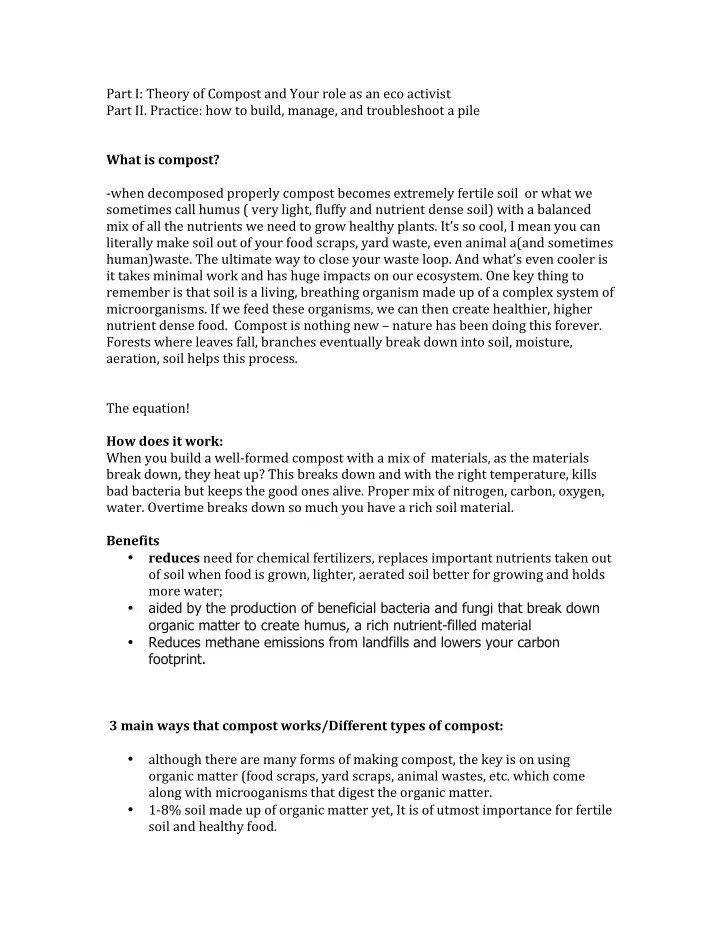

Part I: Theory of Compost and Your role as an eco activist Part II. Practice: how to build, manage, and troubleshoot a pile What is compost? -when decomposed properly compost becomes extremely fertile soil or what we sometimes call humus ( very light, fluffy and nutrient dense soil) with a balanced mix of all the nutrients we need to grow healthy plants. It’s so cool, I mean you can literally make soil out of your food scraps, yard waste, even animal a(and sometimes human)waste. The ultimate way to close your waste loop. And what’s even cooler is it takes minimal work and has huge impacts on our ecosystem. One key thing to remember is that soil is a living, breathing organism made up of a complex system of microorganisms. If we feed these organisms, we can then create healthier, higher nutrient dense food. Compost is nothing new – nature has been doing this forever. Forests where leaves fall, branches eventually break down into soil, moisture, aeration, soil helps this process. The equation! How does it work: When you build a well-formed compost with a mix of materials, as the materials break down, they heat up? This breaks down and with the right temperature, kills bad bacteria but keeps the good ones alive. Proper mix of nitrogen, carbon, oxygen, water. Overtime breaks down so much you have a rich soil material. Benefits • reduces need for chemical fertilizers, replaces important nutrients taken out of soil when food is grown, lighter, aerated soil better for growing and holds more water; • aided by the production of beneficial bacteria and fungi that break down organic matter to create humus, a rich nutrient-filled material • Reduces methane emissions from landfills and lowers your carbon footprint. 3 main ways that compost works/Different types of compost: • although there are many forms of making compost, the key is on using organic matter (food scraps, yard scraps, animal wastes, etc. which come along with microoganisms that digest the organic matter. • 1-8% soil made up of organic matter yet, It is of utmost importance for fertile soil and healthy food.
• Ever wonder why heats: bacteria and fungi in the soil decompose organic matter, producing carbon dioxide and some water. This process, this work is what heats up your compost pile. • main ingredients: you want a good mix for structure, aeration, and proper representation of nutrients; soil adds even more microbial diversity • 30 to 1 carbon to nitrogen ratio, hemophilic so it heats up faster and can break down as fast as 3 months depending on weather; • green veg: nitrogen; dried vegetation/branches/newspaper or cardboard: carbon ( green veg means faster), add soil on top of kitchen waste to minimize smell and stop flies from hatching g larvae • min size 3 ft x 3ft x 3ft or 4x4x4 in colder climates such as dk and want heat up to 140 degrees F • turn to adust moisture, mix up contents for more even breakdown and sometimes even cool off center Various types: Lasagna, 3 bin, worm, rotating bucket, large pile (depends how active you want to be…) - bochasi - biol - green manure? (cover cropping is actually a type of composting) - vermiculture worms (what do worms do?) – how do they work? - Mulches - Cover crops - -composting toilets - compost tea - urine - humanure - the Berkeley method Your role in compost: /Why is it important? - this is exciting but what does this have to do with me/ my everyday life? - Currently food scraps make up from 20-40% or more of the waste we throw away, depending on your consumption patters - Not only are you producing new fertile soil. Even if you don’t use it to grow, you’re still stopping excess waste creation. - soil
- even if not used for soil, a way of decomposing our food so it doesn’t go into landfills and produce methane. Offsetting waste! - closing the loop/cycle -> zero waste/reduce waste - by composting you are actively fighting against climate change, food waste, etc. - What if you can’t compost: even if you don’t compost everything…you can make soup stalk etc. from the left over veggie scraps Home-scale vs garden scale . -the only difference is size, and sometimes home-scale is less focused on the perfect nutrient mix Managing a compost system • location: shady place, adding layers, can cover for moisture retention or heat…needs to breathe and stay like a wet sponge • temperature, materials, how do food/garden scraps suddenly turn into super fertile soil? • maerials – green, brown, …soil?, (water, air, heat) - • vegan/animal/urine • -optimal size • -turning • -amount of time to breakdown (depends) • -why temp important: 1 breakdown, 2 kill microbes/diseases, etc that may be in the soil • -turning a compost pile depends on type you have…how big, and the climate you’re in. why do we turn compost? • -when is it ready; dark, rich color, luight; can sift • Let’s go to the garden to see the different systems and practice some turning… Byhaven 2200 - how we use it Go to the garden, practice turning How we apply compost/when/why – how to use; even if you aren’t using the soil, it is re-creating/recycling into earth instead of creating more waste, gas, sludege in industrial waste facilities. - before planting a bed, around the base of a plant for extra fertility
Recommend
More recommend